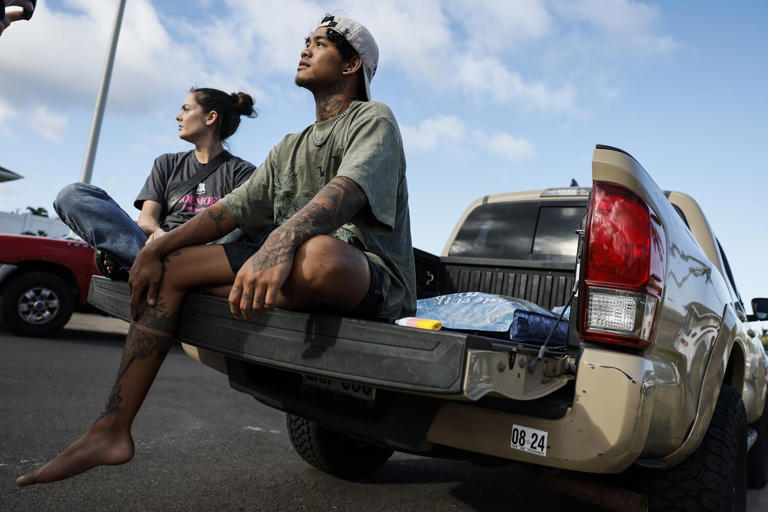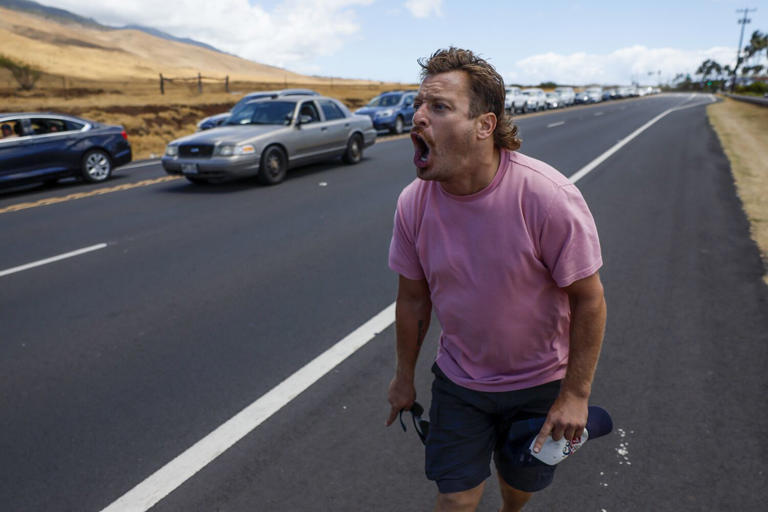After an exhausting day battling to protect his family’s home in Lahaina against hurricane-like wind — it felled trees, tore apart roofs and knocked down power lines — Bryce Baraoidan figured things couldn’t get much worse.
Then he saw dense black smoke blowing his way.
Like so many others in Lahaina, who had lost electricity and internet service hours before the flames arrived Tuesday, Baraoidan and his family were completely cut off from 21st century information sources.
They had nothing to rely on but their five senses and what he called the “coconut telegraph”: friends and neighbors running up and down the street warning, “the fire’s a mile away,” “half a mile,” “a few blocks.”
When they finally made the decision to flee, they drove straight into the nightmare of what surely will go down as the deadliest traffic jam in U.S. history.

There’s only one main road running along the coast of West Maui. To the north, it winds through steep mountains and narrows to one lane around harrowing turns perched high above the ocean. Almost nobody running for their life would choose that.
So the road south quickly became an inferno and a graveyard.
As officials begin the harrowing task of sifting through the rubble and searching for the dead, arguably the easiest to spot and count are those whose lives ended in their cars. There are stories of a couple found in each other’s arms. The bones of one man were found in the back seat on top of the bones of his beloved golden retriever.
“It was bumper to bumper, and I felt like the fire was moving a lot faster than the traffic,” Baraoidan said. “I can’t even imagine all the cars behind me that were stuck. There were so many cars behind me.”
Also Read– Child dies on asylum-seeker bus headed to Chicago
Stories of panicked people jumping into the ocean in a last-ditch attempt to save themselves are all too familiar by now, the images will probably be among the most enduring of what has become the nation’s deadliest wildfire in the last century.
“All of those people were in the traffic jam,” Baraoidan said. “All of those people jumping in the water, they were escaping their cars, escaping the heat.”
His own trip out began in haste. He and his father were originally determined to stay and fight, go down “like captains on a sinking ship”, he said, until they heard a nearby gas station explode.
They knew it was time to run. But being 26 and a product of the Instagram age, just before they left, Baraoidan strapped on a diving mask to protect his eyes, covered his nose and mouth with a bandana, and climbed on his roof to document the moment.
The resulting video is loud, chaotic and bone-chilling — his house and the entire neighborhood behind him were about to turn to ash.
It was obviously time to run.
Baraoidan grabbed his favorite jacket, a memory disk with cherished photos, and his pitbull, Dash.
The family has four vehicles, so they split up, with his mom and his dad each driving one. They abandoned the other to the flames.

In his light brown Toyota Tacoma, with his usually fearless dog turned backward in the passenger’s seat — ears down, tail between his legs and face buried in the upholstery – Baraoidan tried to steer them both to safety.
For a moment, they cruised in silence and Baraoidan felt confident they were going to be OK. “Me and my dog were just chilling,” he said. “I wasn’t too panicked, I wasn’t really shook.”
Also Read– A win for Indigenous rights as Biden grants Grand Canyon area national monument status
But that screaming wind, which had awakened him at 10 a.m. by slamming a piece of wood into his bedroom window and served as a relentless soundtrack all day long, soon blasted him out of his moment of peace.
Before he even reached the main road, wind-driven branches started crashing into his truck with astonishing force. “I thought my windshield was going to break at one point,” Baraoidan said.
Then he hit the traffic jam.
In another brief video he shot from the driver’s seat, brake lights block his way forward and an enormous column of rising black smoke fills his rearview mirror.
But the oncoming lane, northbound, is clear. Asked why he didn’t swing out into that lane and stomp on the accelerator, the soft-spoken Baraoidan seemed surprised.
“I feel like it was just so chaotic,” he said. If he had caused an accident, making things worse for his neighbors, “I could never forgive myself.”
And, so, like everybody else, he sat there, sandwiched between the towering West Maui mountains on his left and the sparkling Pacific Ocean on his right.
“I just did my best to, like, stay put and stay calm,” Baraoidan said.
As is so often the case in natural disasters, the survivors can’t really explain how or why luck spared them and not others. But luck was on Baradoidan’s side. His whole family survived.
Their house, however, is nothing but dirt and ashes, he said. So are almost all the houses in their neighborhood.
Police urged the public to stay out of the areas where search and rescue efforts were underway, cautioning that many families who had lost loved ones had not yet been notified and that the devastated areas could have toxic particles from still-smoldering areas.
Also Read- Biden’s border crisis has hurt everything else in our world and now it’s come for the kids
Roadblocks set up by the police are still keeping thousands of residents away from their destroyed town, but Baraoidan managed to get back in. He’ll never forget what he saw, many of those things too gruesome to describe in print.
But one indelible image he might spend the rest of his life trying to forget is of the police pulling a body out of a house and loading it into a van. “They weren’t using a body bag, they were using trash bags, because I think they don’t have any more body bags.”
As of Saturday evening, the official death toll had reached 89.
“It’s going to go way, way higher” than that, Baraoidan said.
By Sunday, the number was up to 93. Few have yet to be identified. Many more remain unaccounted for — perhaps as many as 1,000 people, according to some accounts.
More than 2,200 structures have been damaged or destroyed, most of them homes. Rebuilding is expected to cost more than $5.5 billion, according to the Pacific Disaster Center and the Federal Emergency Management Agency.
Days after the fire first broke out, firefighting crews are still working to extinguish flare-ups in the Lahaina and Upcountry Maui fires, according to Maui County officials.
Like so many others on the island, the seemingly glacial pace of the government’s response and the slow trickle of information has left Baraoidan feeling like he has to take matters into his own hands. He has joined in convoys of other locals and former neighbors to deliver all manner of supplies to Lahaina.
The way he sees it, he and his community were on their own as soon as the wind knocked the power out Tuesday morning. And they’re on their own again now.
Also Read- Child dies on asylum-seeker bus headed to Chicago
“I don’t know what the government is doing behind the scenes, so I don’t want to assume they’re not doing anything,” Baraoidan said. “But through my eyes, and through a lot of other locals’ eyes, we are all we got right now.”



































